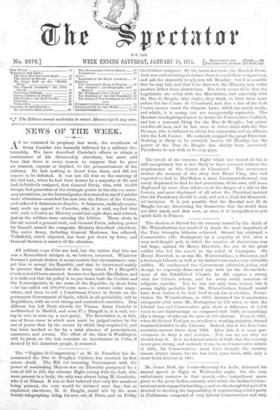The election at Stroud for the vacancy caused 'by the
death of Mr: 1Vinterbotharn has resulted in' much the most important of the Tory triumphs hitherto achieved. Stroud-has returned. a Conservative (Mr. Dorington) by a majority of 991, after a very well-fought poll, in which the number of abstentions was not large, against 'Sir Henry Havelock, the son of the great soldier who led the march to the relief of Cawnpore. Sir Henry Havelock is, as was Mr. Winterbotham, a Dissenter, and a thorough Liberal, as well as his father's son and a very scientific soldier. He condemned the Government education policy, and though he expressly disavowed any wish for the disestablish: ment of the Established Church, he did ' express a strong wish for Church reform, and for every social assertion of religious equality. Yet he has not only been beaten, but it Boehm. highly probable that Mr. 1Vinterbotham hiniself would' have been beaten if he had lived to ask for re-election. Never- theless Mr. Winterbotham, in 1868, distanced his Conservative antagonist (this same Mr. Dorington) by 709 votes, so that the Liberal loss and Conservative gain show a difference of 1,100 vcites to our disadvantage as compared with 1868; or something like a change of sides on the part of 550 electors. Even in I:841, when Sir Robert Peel got so excellent a working majority, Stroud' remained 'faithful to the Liberals. Indeed, this is the first Con- servative success there since 1892. After this, it ig mere per- verseness to deny a real reaction. Nor can we see why we should deny it. It is no Liberal article of faith that the country never goes wrong, and certainly it can be no Conservative article of faith, for Conservatives must have thought the country almost always insane for the last forty years back, with only a short lucid interval in 1841.


































